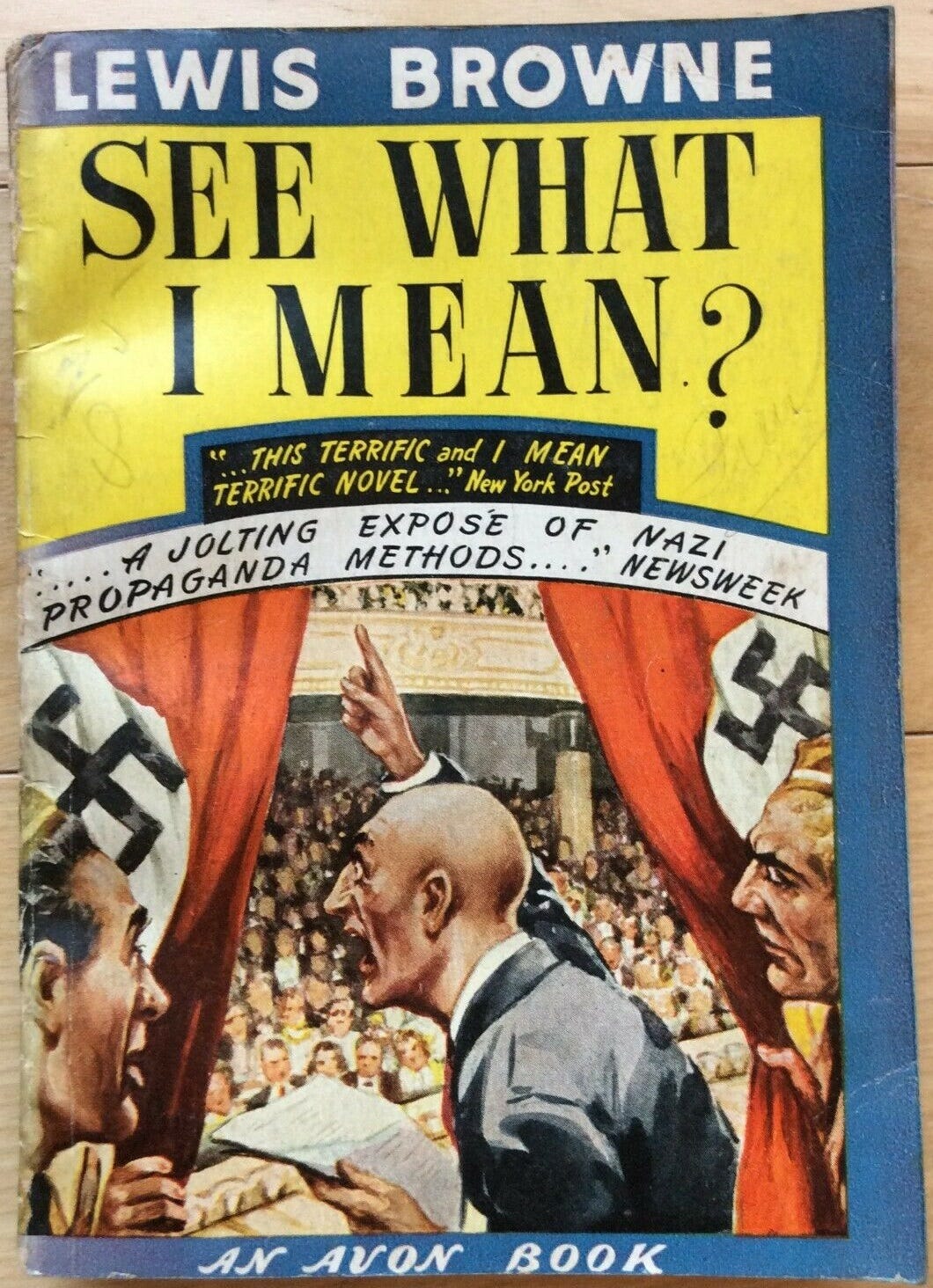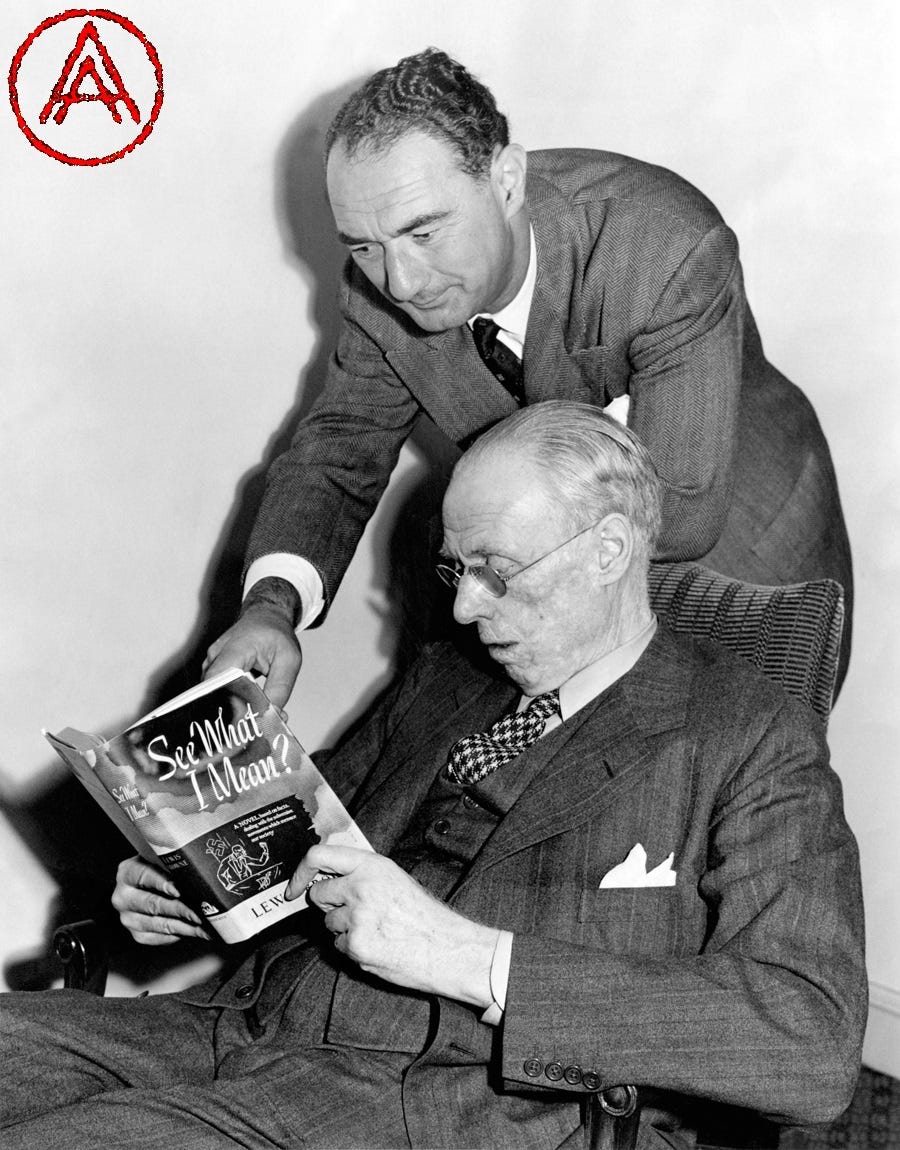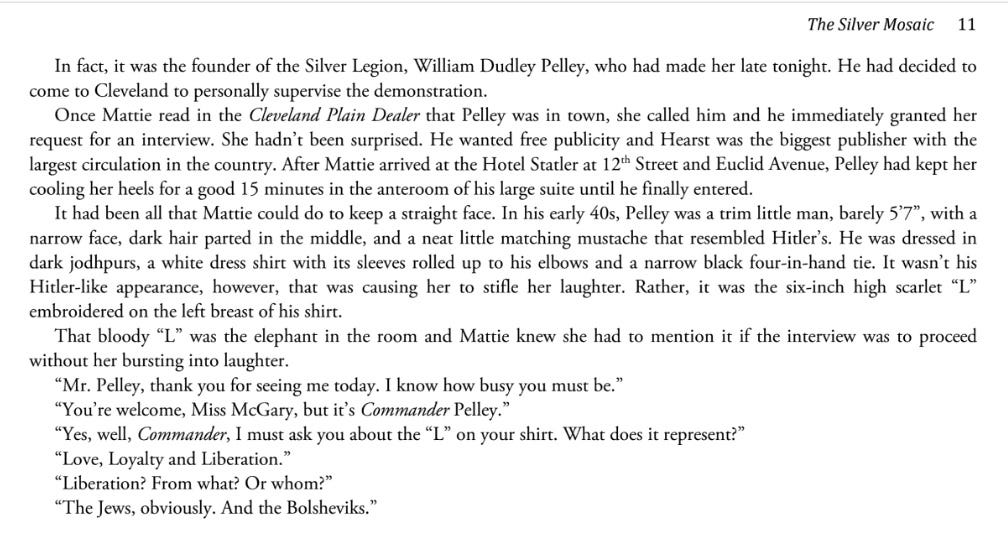Embossed fasces from the cover of ‘It Can’t Happen Here’ by Sinclair Lewis
How to present William Dudley Pelley briefly? That has long been my hang-up. I’ve done articles and radio shows from every imaginable angle. The concept of branding was not foreign to Pelley. Much as Captain Jack Sparrow responded to the insult, “You’re the worst pirate I’ve ever heard of!” with, “But you have heard of me,” I believe Pelley was a subscriber to that old axiom “Any publicity is good publicity.”
Adelaide was reluctant to agree. After all, she and her husband made a living putting forward his books sans politics, with the exception of ‘No More Hunger.’ It must have been painful for her to wrestle with curious people attracted to Fellowship Press because of her father’s unpopular politics rather than in spite of them. As a brash young kid, again, I had a hard time understanding why they wouldn’t embrace that legacy. She never denied it or apologized for it, but in her eyes that phase of his career was so often misconstrued and misrepresented that it was like a huge zit on the nose. It couldn’t be covered up and you know everyone is focused on it, but best ignore it and move along whenever possible.
“We’re all hurtling through the universe on the same giant spaceship Earth,” she told me. “We have to learn to get along.” The Chief had plenty of time to reflect while in prison. Adelaide relates a quote he shared shortly after he was released. “I’ve found too many of my own people mixed up in the shenanigans to ever blame the jews alone again.” Mel and Adelaide were more comfortable criticizing the “Zionists” than using the blanket terms and slurs her father had rattled off with every other breath during the Silvershirt era.
With Mel and Adelaide long dead and no one defending the reputation of Pelley, I finally struck on the brand I wanted for my presentation. Supervillain! Friend and foe alike were wont to use superlatives when describing Pelley. Labels like “most prominent fascist in America” and even “most dangerous man in America” got tossed around in the press with great regularity. Those slogans stuck. Today he is a historical bad guy, poster child for the dangers of domestic fascism. His reputation has not improved.
On the other hand, I collected high praise from his admirers. A prominent black man from Noblesville, once president of the local chapter of the NAACP and the first black city councilman in that town, worked in the Soulcraft print shop for 12 years. He said Pelley was, “the most honest man I ever met.”
<draft notice: need superlative quote from Benn Lewis describing WDP. Following paragraph is a placeholder> Benn E. Lewis (1908-1979) was the portrait artist responsible for most covers of the late Pelley magazine "Over Here." He was also one of the most outspoken torchbearers of the Soulcraft doctrine after Pelley's death. He just so happened to be the son of Russian jewish immigrants, birthname Benjamin Lichtenthal. How's that for the daily Pelley paradox?
I offer these examples by men the press would have us think Pelley would have shoved in an oven given the chance. Whatever your opinion of Pelley, he is most often described in ultimate terms.
At some point I began to consider Pelley as Lex Luthor to Roosevelt’s Superman, the Joker to FDR’s Batman. What if “Four-term Franklin” was actually an asshole? What if his American nemesis warrants closer study? I’ve done that study and then some.
This is a perfect analogy for me because Roosevelt is almost universally adored… in retrospect. In 1940 not so much. Oh, the outcry against giving him a third term. Once the 1944 election rolled around we were so deep in the war that few voters were willing to switch captains. Also, a wartime administration can silence its critics. If you aren’t intimidated into silence or shamed for “opposing the war effort” they can lock you up. Pelley is the textbook example.
Twenty years earlier Pelley was already a popular magazine writer when he read ‘Main Street’ by Sinclair Lewis. His treatment of small town America rankled Pelley. As much as anything, it inspired Pelley to write his Paris, Vermont novels, vindicating and celebrating ordinary Americans.
Pelley returned the favor by inspiring Sinclair Lewis to write ‘It Can’t Happen Here.’
ICHH portrays a domestic fascist leader modeled after Pelley. First written in 1935, it plays to the fear of dictatorship… a right-wing dictatorship, at least. It has no qualms with a Roosevelt dictatorship apparently, as the 1940 edition dust jacket asks:
WHAT WILL HAPPEN TO YOUR FAMILY… if America gets a dictator?
Will your husband be put in a concentration camp?
Will you have to stop going to church?
Will your son have to join the Storm Troopers?
Will your property be confiscated?
Will your daughter lose her job?
Will you lose freedom of speech?
It rather sounds like Roosevelt’s playbook in hindsight.
Another period novel pointed directly at Pelley is ‘See What I Mean?’ by Rabbi Lewis Browne. He didn’t use the title ‘rabbi’ when writing SWIM, but he often used it when writing in the pages of the same magazines as Pelley. They may even have shared a ‘table of contents’ at some point.
Rabbi Browne once wrote an article for the American Magazine, where WDP was practically on staff, titled, ‘What Makes a Jew?’ A newsstand vendor in New York City told Pelley that, when the article came out, Browne came looking for it, took every copy he had and said, “The magazine will reimburse you.”
“I guess that answers the question!” the newsman chortled, and Pelley laughed… and laughed.
‘See What I Mean?’ came years later. The New York press ate it up and wrote glowing reviews, as they had with the Sinclair Lewis scare piece. Lewis and Browne even did a twin book tour touting their allied works of fantasy.
A dozen or more mainstream books published during the late thirties and war era claiming to be non-fiction feature Pelley by name, John Roy Carlson’s ‘Under Cover’ being perhaps the most popular. Carlson would face libel suits from several people who claimed to have been defamed in his book.
Today Pelley is a lazy trope for hack writers. A bibliography of novels since WW2 that mention him by name would run long.
One that I find most interesting was actually written for kids. Pelley comes away looking like Dick Dastardly, tugging at his goatee instead of twisting his moustache.
‘A Spy on the Home Front’ is an entry in the ‘American Girl; Molly Mysteries’ series. The cover art depicts two girls discovering a Silver Shirt in a mysterious trunk.
At least the publisher did some homework. Before the book went to press they sought a photograph of the Silvershirts to include with a chapter on the real life inspiration for their story. It just so happens that I had run across a rare snapshot of a Legion gathering on an “orphaned photo” website. When I identified it for the page owner, he updated the listing and raised the asking price to something like $80. Even though I had very few images of Silvershirts at that time, I passed on it. “American Girl” bought the image and printed it.
I should have gotten my name in the acknowledgements, as I have in most every authoritative account of Pelley written since 1995.
I mentioned comic book supervillains matching Pelley’s public demeanor. Let’s consider Pelley’s potential, even partly realized, evolution into a full-blown cinematic and graphic novel baddie.
-tbc-











Excellent article. Thanks. Adelaide told me that Pelley and his black janitor picketed the Noblesville movie theater together to stop it being segregated. A paradox indeed.
Has it ever been determined if the cross that was burned on the lawn of the funeral home when Pelley was laid out there was a protest or tribute?
The best anti-FDR book is The Roosevelt Myth by John T. Flynn.